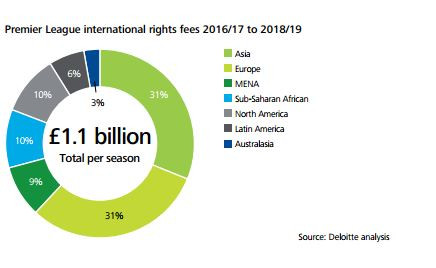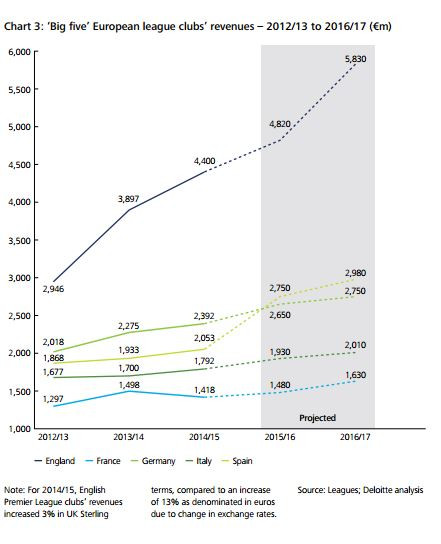Premier League clubs set to break £1bn profit threshold as new TV deal kicks in
New TV deal means more broadcast revenue will be generated this weekend than during the whole 1991-92 season.
Sunderland's trip to Manchester on Saturday will mark an historic occasion for English football. Pep Guardiola takes charge of his first Premier League game and John Stones could make his debut after becoming the most expensive defender in the history of English football.
However, while both are likely to grab the headlines, neither will make history, which will in fact be made at half-time. By then more broadcast revenue will have been generated in the 2016-17 season than by all First Division matches combined 25 years ago, the final season before the Premier League rebrand.
This statistic is even more staggering considering Manchester City vs Sunderland will be only the second Premier League game domestically televised this season, after Hull host defending champions Leicester City in the curtain raiser.
This season marks the start of the new three-year deal for domestic broadcasting rights, which will see Sky and BT Sport fork out a record £5.14bn ($6.67bn) for live Premier League rights for three seasons. For clubs, the deal is considerably better than the already rich £3.02bn agreement that ran from 2013-16.
According to Deloitte's Annual Review of Football Finance report, the £1.1bn that the Premier League will generate from international markets alone for the next three seasons makes the league comfortably the world's highest-earning sports league from media rights in non-domestic markets.
To put things into context, the amount is well over double the revenues generated by La Liga, the Spanish top flight and the next highest, which secured a vastly improved deal for the three seasons from 2015-16 onwards.

"The impact of the Premier League's broadcast deal is clear to see," said Dan Jones from the business consultancy's Sport Business Group.
"For the first time, the Premier League leads the football world in all three key revenue categories – commercial, match day and broadcast – and this is driving sustainable profitability."
Brexit looks to have had a negative impact on the economy and holidaymakers might be feeling the pinch but the Premier League has had no such issues. Earlier this week, Manchester United made Paul Pogba the most expensive player of all time, after paying £89.3m to Juventus for the Frenchman's services.
Across Manchester, City replied with a statement of their own, signing Stones from Everton for £47.5m.
So far, Premier League clubs have spent a combined £855m in transfers in the current transfer window, compared with the £1bn that was spent over the whole of last season. With the transfer window not closing for another three weeks and with its January equivalent still to come, last season's record will be comfortably surpassed.

On average, Premier League clubs have spent £10.3m per transfer – including free transfers – this summer, a new record for the league, and a huge increase on the £6.4m average recorded last season. The figure is also more than double the £4.1m average of the 2006-07 season and speaks volumes for the financial pull of the English top flight.
According to Deloitte, in the 2014-15 season, Premier League wages increased by 7% to £2bn, more than the total spent by Bundesliga and La Liga clubs combined. The rise in wages, however, will be more than offset by the new TV deal, which could see combined operating profits break the £1bn threshold for the first time.
"We feel Premier League clubs have turned the corner, and are entering a new era of sustained profitability," Jones added.
"Clubs are now attractive propositions to investors, and not merely as vanity projects."
The financial boom surrounding the Premier League, however, does not stop with the clubs. The betting industry expects to record a £1.5bn turnover during the season and while a lot of punters bet on lower league games, the Premier League takes the lion's share of wages.
"Leicester's success last season has sparked enormous interest and has rejuvenated the market," a William Hill spokesman told IBTimes UK. "Everyone wants to get in on the act."
The bookmaker said it has registered a sharp increase in in-play betting, while online and mobile betting remain the market's main drivers.
Speaking to IBTimes UK, Mark Pearson from Betfred added that Leicester's unlikely run to the title last season has sparked a flurry of outright bets – those placed at the start of the season, rather than on individual weekends – with punters hoping to capitalise on another shock winner.
Fans feel the pinch
However, while clubs are raking in the cash, very little of their enormous income is passed onto the fans, many of whom feel they pay too much for tickets. The average season ticket in the Premier League costs £501, which amounts to just over £26 per home game.

In March, Premier League clubs agreed to cap the cost of away tickets at £30 for the next three seasons and earlier this week Virgin Media went a step further by agreeing to cap away tickets for fans travelling to Southampton at £20.
The telecoms giant, which became the Saints' main sponsor earlier in June, said it hoped the move would encourage more clubs and sponsors to follow suit.
The initiative was welcomed by the Football Supporters' Federation, which in January 2013 launched its "Twenty's Plenty" campaign, which aims to cap the cost of away tickets in the Premier League at £20.
"Despite football being wealthy we believe very little of it is used to reduce costs for match-goers," said FSF's chief executive Kevin Miles. "Our partnership with Virgin Media shows this doesn't have to be the case – there are innovative ways for sponsors to engage and support match-going fans and Virgin Media are at the forefront of this."
© Copyright IBTimes 2025. All rights reserved.





















